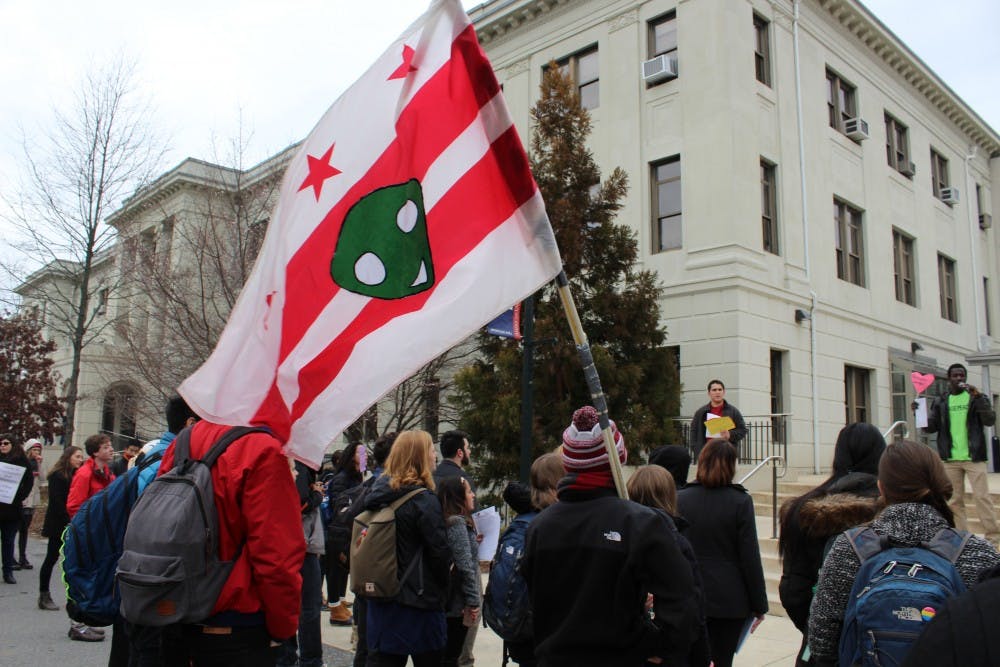Clarification appended.
AU freshman Hosna Seyed-Reihani doesn’t know whether she can visit her grandparents in Iran this year. The looming threat of Trump’s immigration ban, which targets seven predominantly Muslim countries, has threatened Seyed-Reihani’s family’s annual tradition.
Seyed-Reihani immigrated to the U.S. at two-years-old, yet her family -- and her home -- remains in Iran. She is fiercely protective of a culture she describes as hospitable and community-oriented.
“Don’t make me ashamed to be Iranian,” Seyed-Reihani said.
Twenty-one AU students are citizens of six of the seven nations affected by Trump’s executive order -- Iran, Syria, Libya, Sudan, Iraq, and Yemen said Senem Bakar, director of the University’s International Student and Scholar Services. AU faculty advised impacted students against traveling to the affected countries in emails sent to impacted students and at a town hall held Jan. 31, said Bakar.
Nineteen citizens from the seven listed nations had applied to AU for the Fall 2017 semester as of Feb. 3, said Jeremy Lowe, acting director of the Undergraduate Admissions Office. Applicants have contacted the office with concerns, Lowe said.
AU’s faculty senate unanimously voted to officially oppose the ban on Feb. 1.
“It was not a difficult decision,” Provost Scott Bass told The Eagle. “This is a universal position of higher education.”
D.C. is a city awash with diversity, and surrounding universities boast high international student intakes. Fourteen institutions in D.C., including AU, Georgetown University, George Washington University and Howard University, have released statements pledging to support the rights of international students.
After learning of the ban, Seyed-Reihani said her father, a dual citizen, told her he’d sooner revoke his U.S. citizenship than his Iranian one. Her father’s visits to his critically ill mother in Iran are too important to jeopardize.
“We need to go to Iran to see my grandparents,” Seyed-Reihani said.
Freshman Omeed Ansari is a first-generation American with Iranian parents. The 17-year-old said he feels deeply connected to his heritage, and does not know whether he will visit his extended family in May as planned.
“It feels like half of America hates me now just because I’m Persian,” Ansari said.
AU is focused on informing impacted students in a timely manner, said Fanta Aw, Assistant Vice President of Campus Life.
“We just want students to know that we’re here,” she said.
AU’s Muslim Chaplain Imad-ad-Dean Ahmad said he would not live in the United States today had Donald Trump been president 100 years ago.
Ahmad’s father lived in the U.S. illegally for 17 years after fleeing a village outside Jerusalem on a cargo ship in 1922. Initially surviving by peddling scarves on the streets of New York City, Ahmad’s father worked hard and eventually was able to buy his own store. He moved his family to a prosperous town in Pennsylvania, where a neighbor began a petition calling for the removal of the Muslim family.
“It’s funny -- nobody signed the petition and the neighbor moved instead,” said Ahmad.
Ahmad said he believes the ban is arbitrary, considering that the listed nations have an almost nonexistent history of terrorist crimes in the U.S. Terrorist attacks are overwhelmingly the work of homegrown, “right-wing fanatics,” Ahmad said.
Ahmad said he believes that the “temporary” ban is only the beginning, a catalyst for a permanent “final solution.”
“I use that phrase deliberately,” Ahmad said.
Ahmad hosts two weekly prayer services, regularly attended by 30 to 40 students.
AU’s University Chaplain, Reverend Mark Schaefer, attended Friday’s Islamic prayer service and offered condolences to Muslim students. He plans to host weekly luncheons at Kay Spiritual Life Center for international students to “break bread” and support one another.
“I will do anything within my power to ensure that the Muslim community at AU is a fully integrated part of our community,” Schaefer told students at the service. “We would not be the same AU without you.”
news@theeagleonline.com
Clarification appended: The original story referred to President Trump's immigration ban as a "Muslim ban." It has been updated to state "immigration ban, which targets seven predominantly Muslim countries."





